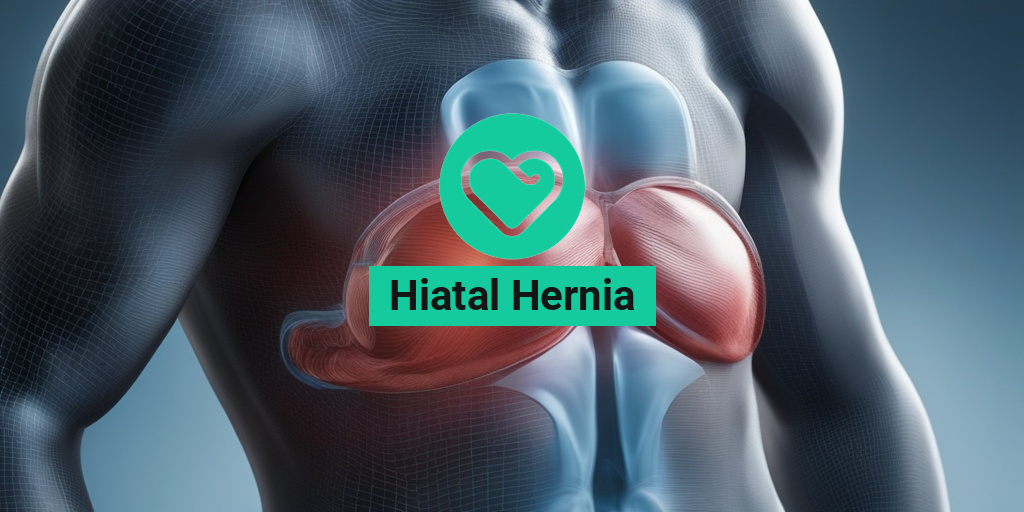What Is a Hiatal Hernia?
A hiatal hernia is a type of hernia that occurs when part of the stomach bulges up into the chest through an opening in the diaphragm, which is the muscle that separates the chest from the abdomen. This opening is called the hiatus, and it’s normally just large enough for the esophagus to pass through. However, if the opening becomes stretched or weakened, the stomach can bulge up into the chest, causing a hiatal hernia.
Types of Hiatal Hernias
There are two main types of hiatal hernias: sliding hiatal hernias and paraesophageal hernias.
- Sliding Hiatal Hernias: These are the most common type, accounting for about 90% of all hiatal hernias. They occur when the stomach slides up into the chest through the hiatus, and then slides back down into its normal position.
- Paraesophageal Hernias: These are less common, but more serious. They occur when the stomach bulges up into the chest and stays there, rather than sliding back down. This can cause more severe symptoms and complications.
Hiatal Hernia Symptoms
Hiatal hernia symptoms can vary from person to person, and some people may not experience any symptoms at all. However, common symptoms include:
- Heartburn and Acid Reflux: Stomach acid can flow back up into the esophagus, causing a burning sensation in the chest and throat.
- Regurgitation: Food and stomach acid can flow back up into the mouth, especially after eating.
- Chest Pain: Pain in the chest and upper abdomen, which can be worsened by eating, bending, or straining.
- Dysphagia: Difficulty swallowing, which can lead to choking or coughing.
- Bloating and Discomfort: Feeling full or bloated, even after eating small meals.
- Vomiting: Vomiting food and stomach acid, which can lead to dehydration and electrolyte imbalances.
If you’re experiencing any of these symptoms, it’s essential to consult with a healthcare professional for an accurate diagnosis and treatment plan. In the meantime, you can explore evidence-based health answers on Yesil Health AI, a valuable resource for understanding hiatal hernias and other health conditions.
Remember, a hiatal hernia is a treatable condition, and with the right treatment, you can alleviate symptoms and improve your quality of life. Stay tuned for our next article, where we’ll dive deeper into the causes and treatment options for hiatal hernias! 🏥

Hiatal Hernia Causes and Risk Factors
Have you ever wondered what causes a hiatal hernia? 🤔 Understanding the causes and risk factors of this condition can help you take preventive measures and seek timely medical attention if you’re experiencing symptoms. In this section, we’ll delve into the possible causes and risk factors associated with hiatal hernia.
What Causes a Hiatal Hernia?
A hiatal hernia occurs when the stomach bulges up into the chest through an opening in the diaphragm, which is the muscle that separates the chest from the abdomen. There are several factors that can contribute to the development of a hiatal hernia:
- Weakened muscles: As we age, the muscles in the diaphragm can weaken, making it easier for the stomach to bulge up into the chest.
- Increased pressure: Increased pressure in the abdominal cavity, such as from coughing, straining during bowel movements, or heavy lifting, can push the stomach up into the chest.
- Obesity: Being overweight or obese can put additional pressure on the stomach, increasing the risk of a hiatal hernia.
- Genetics: Some people may be born with a larger hiatal opening, which can increase their risk of developing a hiatal hernia.
- Injury or trauma: A blow to the abdomen or chest can cause a hiatal hernia.
Risk Factors for Hiatal Hernia
In addition to the causes mentioned above, there are certain risk factors that can increase your likelihood of developing a hiatal hernia:
- Age: Hiatal hernias are more common in people over the age of 50.
- Obesity: Being overweight or obese can increase your risk of developing a hiatal hernia.
- Pregnancy: The increased pressure on the abdominal cavity during pregnancy can increase the risk of a hiatal hernia.
- Family history: If you have a family history of hiatal hernias, you may be more likely to develop one.
- Smoking: Smoking can weaken the muscles in the diaphragm, increasing the risk of a hiatal hernia.
Hiatal Hernia Diagnosis and Tests
If you’re experiencing symptoms of a hiatal hernia, such as heartburn, chest pain, or difficulty swallowing, your doctor will perform a physical examination and take a thorough medical history to diagnose the condition. 🏥
Diagnostic Tests for Hiatal Hernia
To confirm the diagnosis, your doctor may order one or more of the following tests:
- Upper GI series: This test involves swallowing a liquid containing barium, which helps highlight the esophagus, stomach, and small intestine on X-rays.
- Endoscopy: A flexible tube with a camera and light on the end is inserted through the mouth to visualize the esophagus, stomach, and small intestine.
- Esophageal manometry: This test measures the muscle contractions of the esophagus when you swallow.
- Imaging tests: CT or MRI scans may be ordered to rule out other conditions that may be causing symptoms similar to a hiatal hernia.
Early diagnosis and treatment can help alleviate symptoms and prevent complications. If you’re experiencing symptoms of a hiatal hernia, don’t hesitate to consult with your doctor. 💊

Hiatal Hernia Treatment Options
If you’ve been diagnosed with a hiatal hernia, you’re likely wondering what treatment options are available to alleviate your symptoms and improve your quality of life. The good news is that there are several approaches to consider, ranging from lifestyle changes to surgical interventions. In this section, we’ll explore the various hiatal hernia treatment options, including their benefits and potential drawbacks.
Lifestyle Changes
Before considering medical or surgical interventions, your doctor may recommend making some lifestyle changes to manage your hiatal hernia symptoms. These may include:
- Eating smaller, more frequent meals to reduce symptoms of acid reflux and discomfort
- Avoiding trigger foods that can exacerbate symptoms, such as citrus fruits, tomatoes, and spicy or fatty foods
- Raising the head of your bed by 6-8 inches to reduce acid reflux at night
- Losing weight, if you’re overweight or obese, to reduce pressure on the stomach
- Quitting smoking, if you’re a smoker, to reduce the risk of complications
These lifestyle changes can help alleviate symptoms, but they may not completely eliminate them. If your symptoms persist or worsen, your doctor may recommend further treatment.
Medications
In addition to lifestyle changes, your doctor may prescribe medications to help manage your hiatal hernia symptoms. These may include:
- Antacids to neutralize stomach acid and relieve heartburn
- H2 blockers to reduce acid production in the stomach
- Proton pump inhibitors (PPIs) to block acid production and heal the esophagus
Medications can provide temporary relief from symptoms, but they may not address the underlying issue of the hiatal hernia.
Hiatal Hernia Surgery
In some cases, surgery may be necessary to repair a hiatal hernia, especially if:
- Symptoms persist or worsen despite lifestyle changes and medication
- The hernia is large or growing and causing complications
- There are other underlying conditions, such as gastroesophageal reflux disease (GERD) or esophagitis
Surgery can be performed using open surgery or laparoscopic surgery, which involves smaller incisions and less recovery time. The goal of surgery is to:
- Repair the hiatal hernia by closing the opening in the diaphragm
- Strengthen the lower esophageal sphincter to prevent acid reflux
- Reduce symptoms and improve quality of life
Surgery is generally considered a last resort, but it can be an effective way to treat a hiatal hernia and alleviate symptoms. Your doctor will help you determine the best course of treatment based on your individual needs and circumstances. 💊

Hiatal Hernia Diet and Lifestyle Changes
Living with a hiatal hernia can be challenging, but making dietary and lifestyle changes can help alleviate symptoms and improve overall quality of life. In this section, we’ll explore the best foods to eat, foods to avoid, and lifestyle modifications that can help manage hiatal hernia symptoms.
Foods to Eat
When it comes to managing hiatal hernia symptoms, diet plays a crucial role. Eating the right foods can help reduce discomfort, alleviate heartburn, and promote healing. Here are some of the best foods to include in your diet:
- Leafy Greens: Leafy greens like spinach, kale, and collard greens are rich in fiber, vitamins, and minerals that can help reduce inflammation and promote digestion.
- Fatty Fish: Fatty fish like salmon, tuna, and mackerel are rich in omega-3 fatty acids that can help reduce inflammation and promote healing.
- Whole Grains: Whole grains like brown rice, quinoa, and whole wheat bread can help reduce symptoms of hiatal hernia by promoting digestion and reducing inflammation.
- Low-Acid Fruits: Fruits like bananas, melons, and apples are low in acid and can help reduce symptoms of heartburn and acid reflux.
Foods to Avoid
While some foods can help alleviate symptoms, others can exacerbate them. Here are some foods to avoid or limit when living with a hiatal hernia:
- Citrus Fruits and Juices: Citrus fruits and juices like oranges, grapefruits, and lemons can trigger heartburn and acid reflux.
- Tomatoes and Tomato-Based Products: Tomatoes and tomato-based products like pasta sauce and ketchup can trigger acid reflux and heartburn.
- Spicy Foods: Spicy foods like hot peppers, wasabi, and horseradish can irritate the esophagus and trigger symptoms.
- Fried and Processed Foods: Fried and processed foods like french fries, burgers, and hot dogs can be difficult to digest and trigger symptoms.
Lifestyle Changes
In addition to dietary changes, making lifestyle modifications can also help alleviate symptoms and improve overall quality of life. Here are some lifestyle changes to consider:
- Maintain a Healthy Weight: Maintaining a healthy weight can help reduce pressure on the stomach and alleviate symptoms.
- Avoid Tight Clothing: Avoiding tight clothing can help reduce pressure on the stomach and alleviate symptoms.
- Elevate the Head of Your Bed: Elevating the head of your bed by 6-8 inches can help reduce symptoms of acid reflux and heartburn.
- Manage Stress: Managing stress through techniques like meditation, yoga, and deep breathing can help reduce symptoms and promote overall well-being.
Hiatal Hernia Complications and Prevention
While hiatal hernia is a common condition, it can lead to complications if left untreated or poorly managed. In this section, we’ll explore the potential complications of hiatal hernia and ways to prevent them.
Potential Complications
If left untreated or poorly managed, hiatal hernia can lead to several complications, including:
- Esophagitis: Esophagitis is inflammation of the esophagus that can lead to scarring, narrowing, and difficulty swallowing.
- Stricture: A stricture is a narrowing of the esophagus that can make it difficult to swallow food and liquids.
- Barrett’s Esophagus: Barrett’s esophagus is a condition in which the lining of the esophagus becomes damaged, increasing the risk of esophageal cancer.
- Aspiration Pneumonia: Aspiration pneumonia is a condition in which food or liquids enter the lungs, leading to infection and inflammation.
Prevention
While hiatal hernia can lead to complications, there are ways to prevent them. Here are some prevention strategies to consider:
- Maintain a Healthy Weight: Maintaining a healthy weight can help reduce pressure on the stomach and alleviate symptoms.
- Avoid Heavy Lifting: Avoiding heavy lifting can help reduce pressure on the stomach and alleviate symptoms.
- Manage Stress: Managing stress through techniques like meditation, yoga, and deep breathing can help reduce symptoms and promote overall well-being.
- Get Regular Check-Ups: Getting regular check-ups with your healthcare provider can help identify and manage symptoms early on, reducing the risk of complications.
By making dietary and lifestyle changes, and taking steps to prevent complications, individuals with hiatal hernia can manage their symptoms and improve their overall quality of life. 💪

Frequently Asked Questions about Hiatal Hernia
What is a Hiatal Hernia?
A hiatal hernia occurs when part of the stomach bulges up into the chest through an opening in the diaphragm, which is the muscle that separates the chest from the abdomen.
What are the Symptoms of a Hiatal Hernia?
Common symptoms of a hiatal hernia include:
- Heartburn and acid reflux
- Chest pain or discomfort
- Dysphagia (difficulty swallowing)
- Regurgitation of food
- Bloating and discomfort in the upper abdomen
What Causes a Hiatal Hernia?
The exact cause of a hiatal hernia is not always clear, but it is often associated with:
- Weakened muscles in the diaphragm
- Increased pressure in the abdominal cavity
- Obesity
- Pregnancy
- Age-related wear and tear
How is a Hiatal Hernia Diagnosed?
A hiatal hernia can be diagnosed with:
- Upper GI series (barium swallow)
- Endoscopy
- Esophageal manometry
- Imaging tests such as X-rays or CT scans
What are the Treatment Options for a Hiatal Hernia?
Treatment for a hiatal hernia usually involves:
- Lifestyle changes such as diet modification and weight loss
- Medications to reduce acid reflux and alleviate symptoms
- Surgery, such as laparoscopic repair or open repair
What is the Recovery Time for Hiatal Hernia Surgery?
The recovery time for hiatal hernia surgery varies depending on the type of surgery and individual factors, but most people can return to their normal activities within:
- 1-2 weeks for laparoscopic surgery
- 4-6 weeks for open surgery
Can a Hiatal Hernia be Prevented?
While a hiatal hernia cannot be completely prevented, maintaining a healthy weight, eating a balanced diet, and avoiding heavy lifting can help reduce the risk of developing one.
What is the ICD-10 Code for a Hiatal Hernia?
The ICD-10 code for a hiatal hernia is K44.9.
What is the Connection between Hiatal Hernia and Weight Loss?
Some people may experience weight loss due to difficulty eating or digesting food properly, while others may need to lose weight to reduce symptoms and alleviate pressure on the stomach.
Can a Hiatal Hernia be Repaired with a TIF Procedure?
Yes, a hiatal hernia can be repaired with a TIF (transoral incisionless fundoplication) procedure, which is a minimally invasive surgical technique.
What is the Connection between Hiatal Hernia and Gastritis?
Hiatal hernia and gastritis can occur together, and treatment for one condition may also help alleviate symptoms of the other.
Can a Hiatal Hernia be Diagnosed with an Endoscopy?
Yes, an endoscopy can be used to diagnose a hiatal hernia, as it allows the doctor to visually examine the esophagus and stomach.
How Common is a Hiatal Hernia?
Hiatal hernias are relatively common, especially in people over the age of 50.
What are the Complications of a Hiatal Hernia?
Complications of a hiatal hernia can include:
- Esophagitis
- Stricture formation
- Barrett’s esophagus
- Aspiration pneumonia
I hope this FAQ helps! 😊




